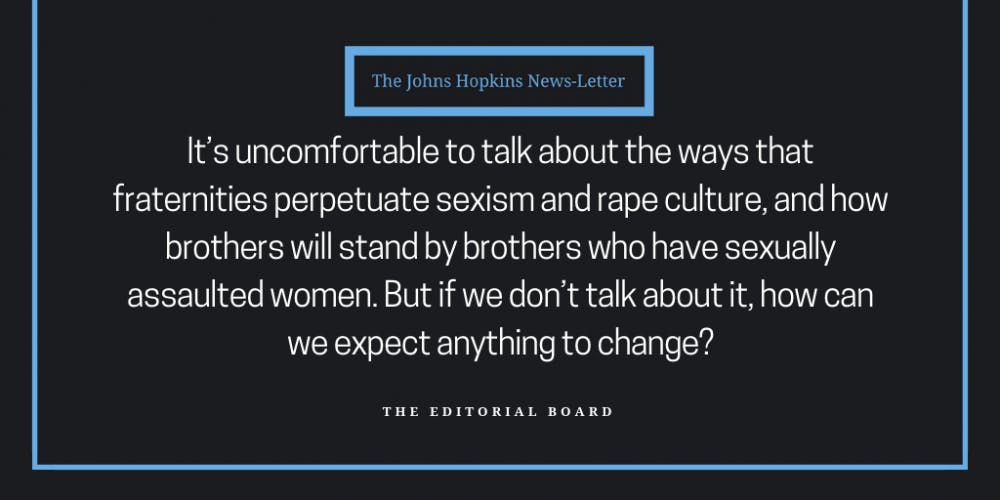It’s February, which means that many fraternities and sororities at Hopkins and at other colleges nationwide have just recruited their newest pledge class. To those new recruits, we extend our congratulations. Many students find a sense of community and lifelong friendships in the Greek organization to which they belong. But to those of you who’ve joined fraternities, we’d also like to express our concerns.
Over the past several years, fraternities nationwide have been put under a microscope after several high-profile student deaths related to hazing. There have been at least 33 documented hazing deaths in the U.S. in the past decade. According to the Chapter Conduct and Disciplinary Status section of the University’s Fraternity and Sorority Life website, the sororities at Hopkins that currently have sanctions only face probation because of low membership engagement that is related to the Congruence Assessment Program (CAP). On the other hand, fraternities face investigations, sanctions or probation for serious acts of misconduct such as hazing, aggravated assault and sexual assault. Since the #MeToo movement began last year, everyone from A-list actors to politicians have had to answer for their transgressions, but fraternities and their cultures have remained largely unaffected. When will this change?
While no Greek organization is perfect, we take particular issue with fraternities that are a part of the Interfraternity Council (IFC) as all those with current sanctions or investigations unrelated to CAP are a part of the IFC. This past year, the Hopkins chapter of Alpha Delta Phi (WAWA) was placed under interim suspension due to hazing allegations and violations of a cease and desist order related to a sexual assault. Sigma Alpha Epsilon (SAE), which hosted a party where a woman was raped in 2014, is also inactive yet continues to operate underground.
That’s just at Hopkins. On Feb. 13, three students filed a lawsuit against Yale University and its nine all-male fraternities after they were groped at fraternity events. Last October at the University of California, Los Angeles, a survivor sued fraternities and the UCLA Interfraternity Council after she was raped and one of her sorority sisters was sexually assaulted by fraternity members. Fraternities at Baylor University, California State University, the University of Texas and more have also faced allegations. The list seems endless, and it continues to grow.
Despite all of the times sexual assaults at fraternity events make the news, there are plenty more that no one ever hears about. What about the men who are protected in spite of their misconduct? What about cases that are never reported to begin with? Or the cases that are shoved under the rug due to inept investigation procedures?
And no one wants to talk about it. The News-Letter has attempted to interview students in Greek life in the past, but each time we’ve been meet with silence and resistance. We all know fraternity members – they’re in our classes, on our sports teams and in our student groups. They’re our friends. It’s uncomfortable to talk about the ways that they perpetuate sexism and rape culture, and how brothers will stand by brothers who have sexually assaulted women. But if we don’t talk about it, how can we expect anything to change?
At Hopkins, the sexist culture of fraternities goes beyond sexual assault — it is rooted in the environment created by fraternity parties. When it is a Friday night and you want to attend a party or social event, you know that fraternities have houses so they are the ones most likely to be hosting. You arrive at the house with a group of friends, and since you know that it is easier to enter a frat party if you are a woman, you have a girl approach the brother at the door. Once you’re inside the house, you know that the men will drink beer while women are offered mixed drinks with an unknown amount of alcohol. Fraternities have a disproportionate amount of power in the Hopkins social scene, and it is this imbalance of power that allows sexist fraternity culture to thrive and persist.
Yes, fraternities can be beneficial to their members. They offer alumni networks, community and academic support. But these benefits pale in comparison to the price we’ve had to pay for their irresponsibility. And the elitism associated with fraternities is precisely what makes it difficult for us to reform them.
According to journalist John Hechinger’s book, “True Gentlemen: The Broken Pledge of America's Fraternities," fraternities control $3 billion in college campus real estate. Forty percent of U.S. presidents have been fraternity members. Moreover, fraternities have extensive influence in Congress — the Fraternity and Sorority Political Action Committee (“FratPAC”) was founded to “protect the fraternal experience” and has notably supported bills that restrict the ability of universities to investigate sexual assaults.
Yes, not all fraternity brothers are predators. Yes, fraternities have tried to right wrongs when allegations are made, and yes, fraternities are not entirely to blame for sexual assault on college campuses. But there’s no denying that fraternities give men who are predators a space to continue to behave irresponsibly and never be reprimanded. Studies have shown that fraternity brothers are three times more likely to rape. As it stands, fraternity members are doing more bad than they are good. At Hopkins, they’ve failed to hold themselves accountable when they have violated suspensions and cease and desist orders, continued to operate underground or remained passive as sexual assaults occurred at parties.
To those men who have just become pledges: we once again extend our congratulations. But we urge you, before you become full-fledged members, to reflect on how fraternities have been complicit in the deaths of countless men and the exploitation of vulnerable women. Is “brotherhood” worth the cost?
Editor’s note: Four out of five members of this week’s Editorial Board are involved in sororities.





